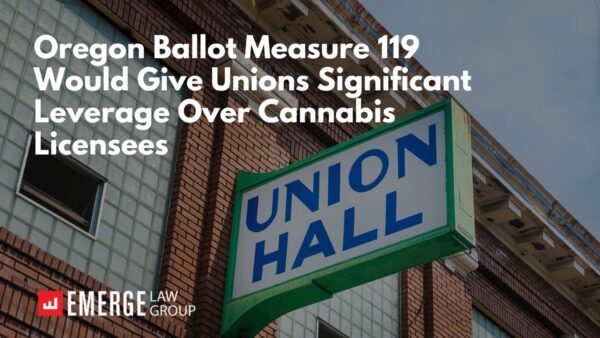CannaBeat is a curated biweekly selection of top new stories impacting business, research, and culture in the cannabis industry, crafted by Emerge Law Group.
Emerge’s Hot Take
Bipartisan Congressional Lawmakers Tout 2022 Marijuana Reform Accomplishments, Predict “Further Progress” Next Session
The fight for federal reform on cannabis laws has been a tireless one to say the least. The states have outgrown the federal structure surrounding cannabis, which is evidenced by 37 states with a legal medical program and 21 states with an adult-use program. This past year shows that movement is possible, although it’s been in baby steps. A Congressional Cannabis Caucus Memorandum has been released highlighting the federal victories of 2022. (Note: Memo included in article) Earlier this month Biden signed the first-ever standalone marijuana reform legislation promoting research, issued a marijuana pardon in October, and directed administrative review of the federal scheduling of cannabis. While cannabis reform is still far from the finish line, each of these is a step forward. Additionally, there were numerous bills introduced into both the House and the Senate pushing for descheduling, expungement, consumer and business protections, and more, demonstrating the overall shift in state and federal support for a legal cannabis industry.
As we move into the next session, it seems like we will once again be at a stalemate between the federal chambers, some congressional members are optimistic. Overall, a majority of both the House and the Senate favors reform, which could lead to further progress in 2023. The Congressional Cannabis Caucus wrote:
The Congressional Cannabis Caucus has brought together a broad coalition of members from diverse communities around the country who all agree: it is time for Congress to finally reform federal cannabis policy. There will be some big changes in the next Congress, but one thing that will not change is that a majority in both the House and the Senate favor reform. We are optimistic for our ability as a caucus to help navigate these changes and make further progress.
The cannabis industry desperately needs some sort of federal reform in order to be a profitable industry. Businesses continue to be overwhelmed by taxation, excessive regulatory oversight, and federal restrictions, and there is only so much each state can individually do.
Other Noteworthy News
Cannabis Industry Gives Back This Holiday Season
Seasonal slogans like “holiday spirit” and “the season of giving” are an annual reminder to give back to those in need. Here are just a few great examples of how cannabis businesses continue to give back. Ayr Wellness, which has dispensaries operating in Arizona, Florida, Massachusetts, Nevada, New Jersey, and Pennsylvania, announced on Dec. 5 that it would be starting its “12 Days of Giving” campaign. While every purchase at its dispensaries will collect $1.12 per transaction to two of its partner organizations, Freedom Grow and Minorities for Medical Marijuana Project Clean Slate Initiative. Overall, Ayr Wellness aims to reach a goal of collecting more than $100,000, which will go toward supporting cannabis prisoners and their families, as well as various advocacy efforts and expungement programs. […] Florida-based AFC Foundation, which offers financing in the cannabis industry, recently made a donation to Georgia-based Corners Outreach organization. In the past, AFC Foundation has also contributed donations to groups like Pennsylvania Court Appointed Special Advocate Association, Yo Soy Ella, and The Weldon Project. According to AFC Foundation president and co-founder Robyn Tannenbaum, it’s essential for the company to give back. […] Michigan-based Puff Cannabis gave out more than 1,700 turkeys prior to Thanksgiving. Now, the brand announced its “Jackets for Joints” event. Running between Dec. 5-18, the campaign is asking for coats and jackets that fit kids between the ages of three to 12. In exchange, Puff is giving out one jar of pre-rolls…..
NYC Starts Legal Weed Sale Intime For the New Year, and the Profits Go to Charity
New York state will kick off legal recreational marijuana sales on Dec. 29, just in time to meet its goal of launching regulated, taxed sales before the end of the year. Housing Works, a New York City-based nonprofit that runs a chain of thrift shops, will launch sales at a 4,400-square-foot Manhattan dispensary at 1 Astor Place, Governor Kathy Hochul said on Wednesday. All proceeds will be directed to the nonprofit. The charity, which provides services to people who were formerly incarcerated and those living with HIV or AIDS, is one of three dozen groups and individuals awarded the state’s first retail licenses last month. “Their decades of work with marginalized communities make them a perfect partner in the effort to ensure that New York’s cannabis market provides meaningful opportunities to those most impacted by the failed cannabis criminalization policies of the past,” said State Senator Liz Krueger in a statement. The launch represents more than just what could be the world’s second-largest legal marijuana market outside of California’s, but a stab at getting regulations right where other states have failed. New York has taken a novel approach that aims to include African Americans — disproportionately arrested for marijuana in the past — in the legal industry. It’s also pledged to separate suppliers from retailers in a so-called two-tier system, in order to try and create a lot of “mom-and-pop” small businesses.
New Jersey Announces $10 Million “Cannabis Equity” Grant for Startup Companies
Startup companies in New Jersey say the process of opening a cannabis business is challenging, especially in communities negatively impacted by the War on Drugs. Some feel left out because most weed retailers currently approved by the state are large corporations formed outside New Jersey. They also say it’s harder to secure funding and real estate sometimes due to the stigma around cannabis.
Now, startups can procure some capital after New Jersey announced a $10 million program called the Cannabis Equity Grant. The New Jersey Economic Development Authority says awardees can use the money for early-stage expenses and technical training. Out of the $10 million allotted to the program, $6 million will go to social equity applicants — people with prior cannabis convictions and those who live in economically disadvantaged areas as defined by the state. “New Jersey is committed to building a thriving and inclusive cannabis sector that maximizes opportunities for underserved communities and people impacted by the War on Drugs, and this program is a major step toward that goal,” said NJEDA CEO Tim Sullivan.
U.S. FDA Weighs Regulations On Cannabis Products In Food and Diet Supplements
The U.S. Food and Drug Administration may finally weigh in with potential food and food supplement guidelines on the use of legal cannabis-derived products in the coming months, some four years after hemp became legal under federal law, The Wall Street Journal reported Tuesday. The FDA will decide within months on how legal cannabis and cannabis-derived cannabidiol (CBD) should be regulated, officials told the newspaper. “I don’t think that we can have the perfect be the enemy of the good when we’re looking at such a vast market that is so available and utilized,” FDA adviser Norman Birenbaum said in the article. “You’ve got a widely unregulated market.” The FDA’s effort comes after a death of a child in Virginia who had eaten gummies containing Delta-8, an ingredient made from hemp. “The safety profiles around these products are not what they are generally accustomed to and not the same as what they get from other products when they walk into a wellness store or grocery store or even a gas station,” Birenbaum said. Hemp was legalized in the annual Farm Bill back in 2018, but the FDA has not published any safety guideline or labeling requirements for CBD partly because cannabis remains a prohibited drug under federal law.
The CannaBeat Podcast
Copernican Solutions for Hemp & Cannabis
Six years after Proposition 64, cannabis consultant Joanna Cedar explains why cannabis “legalization” caused most Sonoma County cultivators to exit the industry. In her analysis, Sonoma County’s ordinance is the worst offender, because it prohibited commercial cultivation on parcels smaller than 2 acres. With that decision, Sonoma County eliminated the cottage license-type before anyone had a chance to apply. Prop. 64 isn’t blameless, of course, but nothing hurt Sonoma’s cultivators like that ordinance: at one point, as many as 5,000 parcels were used for growing cannabis. Over ninety percent (90%) are now out of the regulated market, because they shuttered or because they’re selling exclusively to the illicit market. But on parcels large and small, through California, hemp cultivation persists. And there’s a nationwide market for hemp. Someone can drive a tractor trailer filled with hemp from California to Florida, as easily as onions. Hemp is underregulated, however, with no or minimal age-gating, testing and labeling standards. Joanna Cedar’s “Copernican solution” to the mis-regulation of cannabis and hemp is to unite the two under one regulatory scheme. In truth, they are united in nature (they’re two names for the same plant), but our mis-regulation of the plant has become baroque.
Subscribe to CannaBeat to receive a curated biweekly selection of top new stories impacting business, research, and culture in the cannabis industry, crafted by Emerge Law Group, delivered straight to your inbox.
CannaBeat by Emerge Law Group
CannaBeat is a curated selection of top new stories impacting business, research, and culture in the cannabis industry, crafted by Emerge Law Group.






